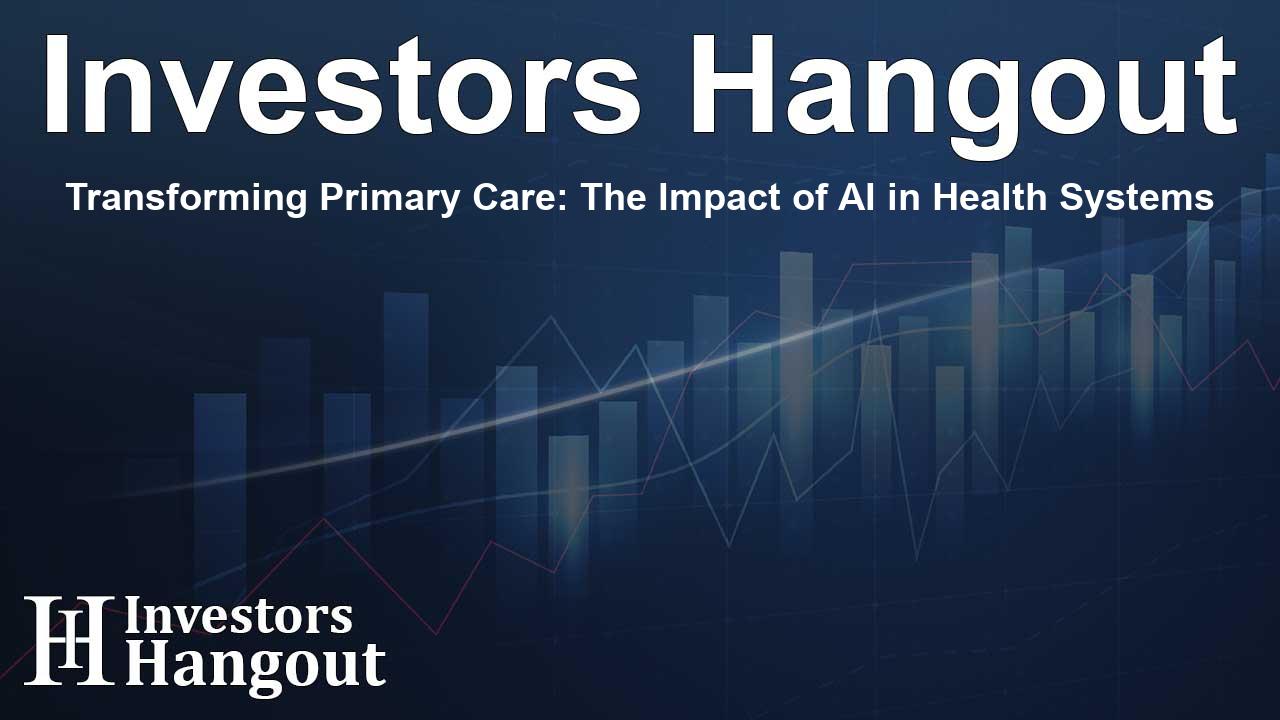Transforming Primary Care: The Impact of AI in Health Systems

Redefining Primary Care in U.S. Health Systems
Primary care is rapidly becoming the focal point of health system strategies across the United States. According to research by Bain & Company, more healthcare providers are committing to enhancing primary care, aiming to improve various aspects of patient care and operational efficiency. This shift is largely influenced by growing recognition of the importance of patient experience and cost management in today's healthcare landscape.
Value-Based Care Models and AI Adoption
One of the most significant transitions in healthcare is moving away from traditional fee-for-service models toward value-based care. Health systems are actively planning to expand their primary care offerings and workforce. About 77% of executives surveyed by Bain are focused on increasing their primary care footprint by introducing more owned practices and bolstering their teams with additional primary care providers. Artificial intelligence (AI) is seen as a crucial component in this evolution, with health systems looking to leverage its capabilities to ease operational burdens and enhance patient care.
Growing Trust in Digital Tools
As healthcare technology evolves, so does patient comfort with using digital tools and AI in their care. Recent studies show a marked increase in patients' willingness to embrace AI for tasks like taking notes during consultations and analyzing medical data. This growing comfort is essential for the successful implementation of new healthcare technologies.
Challenges in Workforce and Technology Integration
Despite the progress towards integrating technology and AI into primary care, significant challenges remain, particularly with workforce shortages. Many health system leaders identified recruiting and retaining skilled healthcare professionals as their top priority. This concern ranks higher than financial viability and patient satisfaction, highlighting the urgent need for solutions that address these workforce challenges.
The Future of Primary Care
As primary care continues to evolve, the future remains uncertain. Will traditional fee-for-service models maintain their dominance, or will innovative, AI-driven approaches take center stage? The pathway forward seems to favor a transition toward integrated care models that prioritize population health and encourage collaborative practices among healthcare providers.
Technological Advancements Shaping Primary Care
Investment in AI and digital health technologies is gaining momentum. Health systems are starting to roll out tools designed to streamline operations and reduce administrative workloads for clinicians. The integration of AI into healthcare not only promises to enhance efficiency but also to support more patient-centered care models. For example, forecasts suggest significant increases in the adoption of e-prescribing systems, appointment scheduling, and telehealth platforms within the next few years.
Patient Experience and AI
As the healthcare landscape adapts to include more digital tools, patient preferences will undoubtedly evolve as well. While many patients are increasingly open to using AI for certain tasks, there's still some hesitance regarding completely automated roles in their healthcare. Preferences for in-person visits remain strong, showing that although technology can enhance care, it cannot completely replace the human touch in healthcare service delivery.
Conclusion
The ongoing transformation of primary care within U.S. health systems, driven by the convergence of AI and value-based care models, presents both immense opportunities and challenges. As healthcare providers strive to enhance patient outcomes and satisfaction, the key will be successfully navigating workforce limitations and embracing new technologies to create a sustainable future in healthcare.
Frequently Asked Questions
What is driving the shift towards primary care in health systems?
Health systems are recognizing the importance of patient experience and cost management, prompting a strategic focus on enhancing primary care services.
How is AI impacting primary care?
AI is being increasingly adopted to reduce clinician burdens, improve efficiencies, and support new care models that prioritize patient outcomes.
What challenges are health systems facing in workforce management?
Recruiting and retaining healthcare professionals is a primary concern due to ongoing workforce shortages, impacting operational stability.
Are patients comfortable with AI in their healthcare?
Patient comfort with using AI is growing, though some skepticism remains about fully automated processes in healthcare.
What is the future of primary care delivery?
The future is likely to see a blend of traditional and innovative AI-driven approaches, leaning towards value-based care models that center on patient health outcomes.
About The Author
Contact Henry Turner privately here. Or send an email with ATTN: Henry Turner as the subject to contact@investorshangout.com.
About Investors Hangout
Investors Hangout is a leading online stock forum for financial discussion and learning, offering a wide range of free tools and resources. It draws in traders of all levels, who exchange market knowledge, investigate trading tactics, and keep an eye on industry developments in real time. Featuring financial articles, stock message boards, quotes, charts, company profiles, and live news updates. Through cooperative learning and a wealth of informational resources, it helps users from novices creating their first portfolios to experts honing their techniques. Join Investors Hangout today: https://investorshangout.com/
The content of this article is based on factual, publicly available information and does not represent legal, financial, or investment advice. Investors Hangout does not offer financial advice, and the author is not a licensed financial advisor. Consult a qualified advisor before making any financial or investment decisions based on this article. This article should not be considered advice to purchase, sell, or hold any securities or other investments. If any of the material provided here is inaccurate, please contact us for corrections.
